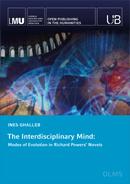The Interdisciplinary Mind: Modes of Evolution in Richard Powers’ Novels
Synopsis
This study reveals how interdisciplinarity is necessary for the evolution of writing, while it identifies modes of artificial evolution in Powers’ novels. Three prominent types of artificial evolution are addressed: human genome engineering, brain malleability, and artificial intelligence. The book tackles civilizational dynamics in the light of clashes of groups with the same identity, as well as terrorism and wars. It examines artistic evolution through “iconoclash,” interweaving virtual environment CAVE-, architecture-, and scripture-like structures. By exploring these aspects, the novels’ interdisciplinary structures become visible. This book shows that the interdisciplinary novel is liquescent and multiplanar. Its narrative structures are imprinted with superimposed cross-cultural and interdisciplinary strata. These establish not only interconnections but also evolutionary exponential trends.
The book includes a conversation with Richard Powers.
This book is also available in print.
Downloads

Published
Categories
License
Copyright (c) 2021 Ines Ghalleb

This work is licensed under a Creative Commons Attribution 4.0 International License.

